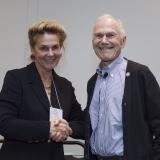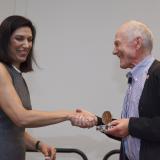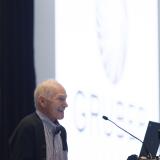2016 Gruber Genetics Prize
Molecular biologists Michael Grunstein, PhD, of the University of California, Los Angeles (UCLA), and C. David Allis, PhD, of The Rockefeller University have been pioneers in identifying and describing how histone modifications and chromatin structure affect gene regulation. Their groundbreaking discoveries not only revolutionized our understanding of molecular biology, but also were instrumental in launching the modern study of histones in epigenetics, with broad implications for human health and disease.
2016 Genetics Prize Recipients
Laureate Profile
Molecular biologists, Michael Grunstein, PhD, of the University of California, Los Angeles (UCLA), and C. David Allis, PhD, of The Rockefeller University made groundbreaking discoveries that have greatly expanded our understanding of how genes are expressed and controlled. In the 1970s, when both men were beginning their careers, they became intrigued by the possible role of histones in gene regulation. At the time, most scientists believed that these proteins were nothing more than the inert material that “packages” DNA into structures called nucleosomes, which are the building blocks of the chromatin complex that forms chromosomes within the nucleus of eukaryotic cells. That view was shattered, however, in 1988, when Grunstein demonstrated—for the first time—that histones perform highly specific roles in regulating gene transcription in living cells and that histones themselves are the direct targets of certain transcriptional regulatory proteins. A few years later Allis and Grunstein identified specific enzymes that add or remove an acetyl chemical group to or from the tail of a histone molecule that protrudes from the nucleosome.
The results of these and subsequent discoveries by Grunstein and Allis revolutionized molecular genetics, for they demonstrated unequivocally that changes to histones and the chromatin structure alter gene activity without affecting the DNA sequence itself. This area of study—epigenetics—is now one of the fastest growing in science. Its implications are enormous and have already led scientists to develop new approaches for treating human disease, including birth defects, cancer, and neurological disorders.
Citation
The Gruber Foundation proudly presents the 2016 Genetics Prize to Michael Grunstein and David Allis for the discovery of the role of histone proteins and their covalent modification in the regulation of eukaryotic gene expression.















































